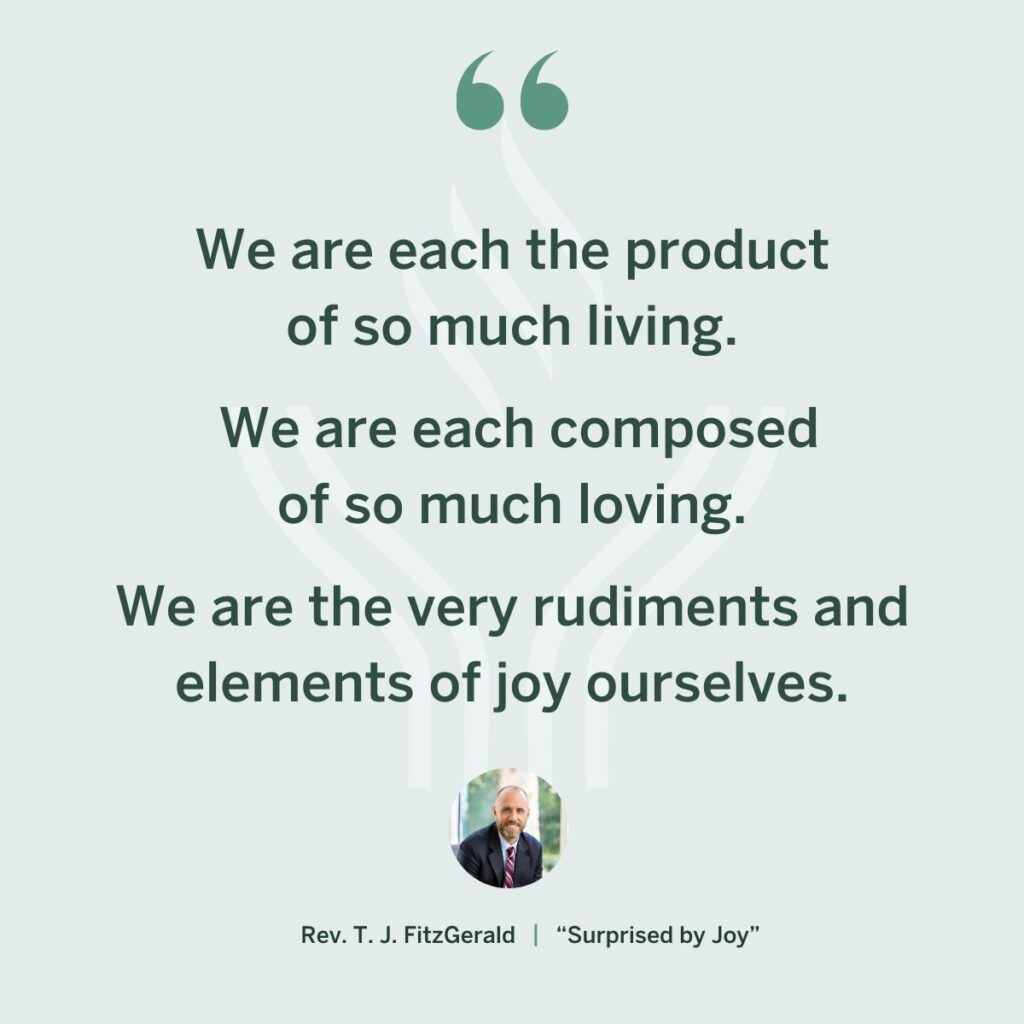Surprised by Joy | Rev. T. J. FitzGerald | 02.04.24


Joy is one of the greatest spiritual gifts. How do we experience it? How do we share it?
Sermon Transcript
Activating Your Spiritual Life
Well, friends, we made it. You are at the end of this worship series, Activating Your Spiritual Life. We’ve talked about letting go, about saying no, about ways to save your very spiritual life, about the life and the teachings of Dr. King. So how’s it going? You feeling activated? Me too.
Now that’s not an accident, all that activation. A lot of planning went into this year. Waves of purpose, tides of change. This series is one of those waves that we imagine can help shift the tide that is coming. To that end, tomorrow is the last day to register to vote in the primaries or to change your address for voting. All right. Everyone hears that, right? And you’re going to tell all your friends after worship, right? Because I know no one here is being lax with that. There, ended that sermon.
This series is one of these waves that helps shift the tide. I remember during one of the planning sessions for this series. We were thinking about how this series would end. And I advocated for this day for a sermon, for a service about joy. And we discussed whether joy is really part of activating your spiritual life. And I said, “Well, it may not be part of it. It’s certainly one of the reasons why you do it. It’s like, I don’t know one of the joyful fruits of doing this work.” And someone asked, “Well, who’s going to preach on joyful fruit, T. J.?” There was a pause and I could feel people looking at me. And I said, “Well, if anyone’s going to preach about being a joyful fruit, it ought to be someone who knows about it.” And I wrote down my name on the sheet. I don’t know if that’s exactly how it went down, but here we are.
The Experience of Joy
Think about the first time you experienced joy or maybe better yet, how did it feel? Remember the feeling? I can remember one of mine really clearly. I was in the second grade and sitting on the floor of the cafetorium. Not a site where lots of joyful things happen. And it’s not just because that’s its name, mind you. But on this day in the cafetorium up on the stage were some of the older children at the school and with them were their musical instruments. They were there to show us younger kids some of the instruments so we could make a decision about which of those we’d like to study next year in our music classes. And the group played “Wipe Out.” The wonderful instrumental piece from the surf rock genre. Even if you know the song, imagine a guitar heavy recording translated by third and fourth graders onto brass instruments.
It was a euphonium extravaganza. But to be fair, about those brass instruments and those euphoniums, I remember not a thing because then came the drum solo. That kid, the one playing the drum who I had never noticed before. That kid I didn’t even think of twice before that day calmly like they were just hanging out up there, started that drum break and it took my breath away for the entire duration of the solo. The feeling in my belly as the perfect measures of rhythm echoed in me made me want to squeal or shriek.
And that feeling stayed with me all through the day, all on the bus ride home, right until I burst through the door and said the first thing every parent wants to hear from their 7-year-old, “Mom, “I want to play the drums.” And it took a few years, but the joy stayed with me and I convinced my parents that having a drum set in the house of my very own was the only thing that would bring me joy. And what do you think happened? As it turns out, someone else playing the drums live just a few feet away from my tiny little face that I’d never heard before in this wondrous way, joy.
Years of lessons, reading drum kit notation, the drums not sounding the way I wanted them to, wasting my parents’ money on lessons and hearing about it. A band teacher saying I wouldn’t be able to play percussion in the band because I wasn’t talented enough. Not joy, not joy. I wanted there to be a one to one relationship between what I felt that day and what I could get out of learning the drums, but there was not. One was joy. The other, well, was something other than joy.
Joy vs. Happiness & Pleasure
In his work, Surprised by Joy, C. S. Lewis describes a sensation much like the one that fine drum solo brought on.
Lewis’s words, “I call it joy, which is here, a technical term and must be sharply distinguished from both happiness and from pleasure. Joy in my sense has indeed one characteristic and one only in common with them. The fact that anyone who has experienced it will want it again. I doubt whether anyone who has tasted it would ever if both were in his power, exchange it for all the pleasures of the world. But then joy is never in our power and pleasure often is.”
And that is true. Joy never comes from something I control. I remember a Christmas morning many years ago, I was hosting my parents in my apartment in New York City and on Christmas morning I had a short errand to run very early, so I snuck out quietly. I’m not Santa Claus, but if I were, I couldn’t tell you. But when I returned from that early morning errand still really early, my dad was sort of sitting up on his bed and looking out the window. He was wide awake and sort of stunned really. His mouth was even kind of gaping open a little bit. And I said, “What’s wrong?” He turned to me to answer and just as he prepared to speak, I heard it. Because my five-year-old neighbor, it was painfully apparent, had gotten drums for Christmas that morning and that five-year-old was filled with Christmas joy.
I don’t know what it says about me that I have told that story so many times with such great joy and I don’t know what it says about you that you laughed at it. But what we can be certain of is that it was not my father’s favorite morning. He had no control over what was happening, and that’s part of the joy. It’s in the surprise, it’s in the unexpected, the unasked for way that it comes. That joy is so different than other things in our world. It’s rarely in our control, rarely in our reach, even when it arises amid something that is happening around us that is hard or that is disturbing. It just comes almost always by surprise and it’s so annoying.
Why is that? I want my joy when I want my joy.
Cultivating Joy
Some believe joy comes when we cultivate it by remembering and acknowledging the lives that loved us into being in this very moment. In The Book of Joy, auspiciously titled, Archbishop Desmond Tutu and the Dalai Lama write about this relationship as one of the roots of joy. The book provides some instructions to try to build more joy into our lives. And one exercise they use gets in touch with our humanity to gain a little sense of our own humility, and this is one of the meditations. Let’s do it together.
It takes just a few minutes here, so close your eyes or do whatever you want to do.
Reflect on all the people who are responsible for your life. Think of your parents who gave you life, your teachers who taught you, the people who grew your food and who made your clothes. The countless others who are responsible for your having the life that you have each and every day. Now, think of all those who discovered and created all of the things we take for granted. The housing, the crops, and the medicines that keep you alive. Think of all the ancestors who had to live and survive so that you could be born, who braved enormous hardship so that you could have the life that you do.
Now, think of the family and friends who give your life meaning and purpose. Allow your heart to open and experience love and appreciation for all of these people. Experience the enormous joy and appreciation that comes from being in touch with all that has been given to you, in realizing how dependent we are on others, how weak in our separateness, and yet how strong in our togetherness.
And I welcome you back into this space now, from that. It’s beautiful, right? Now I’m not a parent. I can only dream of a 7-year-old who wants drums. But when people with children think of joy, they often think of the gifts of becoming a parent and the moments of wonder that follow.
But what else could remind us so well of how dependent we are on others? What else could remind us so well how weak we are when we are separated and the strength that comes from community? It’s that deep remembering. Its ground from which joyful fruit may spring. All of the ways we have worked these past few weeks to deepen and activate our spiritual lives are techniques that can help us see how deep, how powerful, how inspiringly real the interdependence we need in our lives and in this world we share is to each and every one of us. And sometimes that interconnection we need for joy is at risk and worse than being at risk, sometimes we just give it away.
The Challenge of Joy in Modern Times
You know where there is almost no joy available? I’m holding up my phone for those of you who cannot see. This week, hearings before Congress heard the testimony of families whose children were harmed by online interactions unchecked by these companies. Those families told terrifying stories of heartbreaking lapses in care for the youngest and most vulnerable among us. That all took place through devices like our phones. But we don’t need hearings in Congress to know that. I believe that more than these have brought us closer together, more than these phones, these devices, the companies who wish to profit from our interactions on them to commodify and market our attention, have created ways to divide us, to brand us.
Make no mistake, we are a brand. To create adversaries where there should be friends, to force comparison when likeness and kindness is really what fosters joy. For always comparison will be the thief of joy. You could bet on that. Now, I’m not saying toss the phone all the way across the room and I’m not going to collect them at the door though you could make an argument. I’m just asking how much time we really need to spend with something that we know holds so little joy in store for us. Because there is plenty more drawing us away from joy right now.
Around the world, unheeded calls for a humanitarian ceasefire in Gaza and the calls of those who long for the return of those held captive tear at the heart of the world. The escalation of conflicts this week and even last night into surrounding countries. The deaths of US soldiers threaten more tension and more standoffs and more and more loss of life, in a region of the world that holds so much meaning for so many. The drumbeat of conflict and devastation of people beats and beats and beats loud in us today.
So it can seem strange to talk about joy right now. Can contributing joy to the lives of others even amid the torment of members of our human family really help? Is it enough? Can choosing to draw from more wells than the well of fear, the well of rage, the well of shock and injustice? Can choosing this be part of how we respond to these times? In these times? You can say no to me, that’s fine, but you cannot say no to joy.
And just like the author in our reading couldn’t. Leaving the bedside of his dying brother, his daughter breaks out into a song from West Side Story. One that Chita Rivera herself helped to sing who we lost this week. Joy in the beauty of a child’s singing and dancing leaps in the heart of the poet with the power of waves of wild animals across a savanna. Even when he’s watching his brother fade from life, maybe because of it watching a life he helped to mold find joy, bring him joy despite the horror that life can hold for him and the poet is in good company.
Dr. King’s “Drum Major Instinct”
It was on this day, February 4th, 1968, that Dr. King delivered his fateful sermon, The Drum Major Instinct. In it, he addresses the deep need in all of us and universal expression to be seen, to be needed, to be important.
It’s an instinct that beats from generation to generation. And he said of it is the drum major impulse and longing that runs the gamut of human life. And so we see it everywhere. This quest for recognition and we join things, over join really, that we think that we will find the recognition in. “If unchecked and distorted over time, fed with extreme power on a global scale, this impulse has the power to destroy a person, a city, a nation, and a world,” King said. “But if tempered, if directed with spiritual discipline, with an activated spiritual life, this impulse can have enormous beneficial impact.”
In his final moment of the sermon, two months to the day before he was gunned down for the freedom he espoused, he said this. “If you want to say that I was a drum major, say that I was a drum major for justice, say that I was a drum major for peace. I was a drum major for righteousness and all the other shallow things will not matter.”
There is a crack in everything, that’s how the light gets in
So much tears at the root of joy and flowers celebrate 65 years of love. Right here. This is the nexus of this interconnection of all generations, of all life that pumps in every single one of our veins. It is the inheritance of humanity that is us, here now.
Where the inherent worth and dignity of all people is our joy to celebrate together. I feel the joy with you. I believe because that celebration of all of we are is the fertile ground, how we see the world and the people in it, how we can give life and grow all of you joyful fruits together. We are each the product of so much living. We are each composed of so much loving. We are the very rudiments and elements of joy ourselves. This week, the song by Leonard Cohen has been stuck in my brain.
He sings, “I can’t run no more with that lawless crowd. While the killers in high places say their prayers out loud, but they’ve summoned. They’ve summoned up a thundercloud and they’re going to hear from me. Ring the bells that still can ring. Forget your perfect offering. There is a crack in everything. That’s how the light gets in. That’s how the light gets in.”
The crack in everything is its impermanence. The acknowledgement that all of this is fleeting, even us here, and that’s how the lights gets in my friends. That’s how the joy gets in. When we embrace that we have only this time to do the work we have to do in the world. The joy that will emanate from that work we do will shine in the lives of this world that only no dim despair right now.
That’s how the joy gets in. When we honor those millions and millions of lives that led to each of our own precious lives, caring for others by laboring for justice, and by welcoming those yearning to be free. That’s how the joy gets in. And when we march to the beat of our own drum major, breathless with the joy of new rhythms, the joy doesn’t just get in. That’s how the joy gets out. That’s right. So ring the bells, crash your cymbals, whatever they may be, and beat your drum till you wake up the world. Let them hear you. Let them hear joy from you, and let them hear joy from us, and may it ever be so blessed be and amen.








